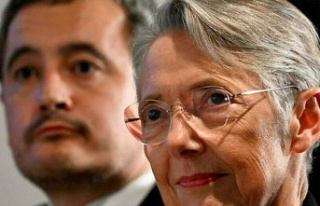"The attackers continue to attack the hospital, destroy the machines, steal the drugs and materials. Markets remain closed. Robberies continue throughout the city. They are perpetrated by both gunmen and civilians," said Salah Tour, a doctor working at the main public hospital in el-Geneina. The capital of Western Darfur was once again transformed into the scene of deadly clashes from April 24. The conflict between the Sudanese Armed Forces (SAF) and the Rapid Support Forces (RSF) then entered its tenth day.
On this Thursday, May 4, Salah Tour explains that the shooting has finally stopped. Without allowing the doors of his clinic to be reopened, despite the dozens of injured people waiting to be treated. "It's a disaster," repeats the practitioner. With his colleagues, they operate from an annex branch to receive the victims. Those in need of surgery could be evacuated to neighboring Chad where at least 21,000 Sudanese have taken refuge since mid-April. According to Médecins Sans Frontières (MSF), the clashes between the two generals, the head of the SAF Abdel Fattah al-Burhane, and that of the RSF Mohamed Hamdan Dagalo known as "Hemeti", left at least 100 dead and more than 400 injured. in this state. A provisional report from the Ministry of Health counts 551 dead and 4,926 injured at the national level.
Targeted displaced populations
The north and south of Darfur, a huge region the size of Spain, are also very affected by this fighting. As well as by the looting resulting from the withdrawal of the forces of order. It is nevertheless in the West that the situation is most critical. "An ethnic conflict has taken place there on average every six months since the fall of Omar al-Bashir in April 2019. These clashes between the RSF and the army do not help matters since they create a security vacuum which could contribute to new fights between Arab communities, not necessarily loyal to the RSF and who have their own agenda for controlling the territory, and non-Arab communities, who have not forgotten that they have been victims of the armed than the RSF but are determined to defend or take back their ancestral lands", analyzes researcher Jérôme Tubiana, adviser for MSF.
Last January, the Norwegian Refugees Council (NRC) counted 83,017 displaced people in el-Geneina. Most of these populations survive around public buildings in the city. Their shelters within the camps have often been destroyed during previous assaults. These very precarious families were once again targeted from April 24. "Arab community leaders have been calling since 2919 for the dismantling of intramural camps and their relocation outside the city," said Mohamed Osman, Sudan researcher for Human Rights Watch. In question, the massive armament of these citizens mainly belongs to the so-called non-Arab peoples. This race for guns is seen as a threat to populations close to the RSF and other Janjawid militias, who are already massively armed.
A very precarious appeasement
In any case, this situation leads the civilians to an impasse. “What worries us the most is the fate of the internally displaced who are living in makeshift camps under tents or twigs. They have nowhere to go and no wall to hide behind,” warns Mathilde Vu, NRC Advocacy Officer. Among these vulnerable populations, many women have survived rape in the past. Nahlla Yousif, a representative of the NGO Elmostagbal for Enlightenment and Development, lists nine rapes perpetrated in el-Geneina since the start of the war. Some victims are minors. The merchants of el-Geneina were not spared either. The stalls in the central market were systematically stolen and then destroyed or set on fire. "We expect more fighting to take place," warns a colleague from Salah Tour, despite the relative calm on May 4. Regular and paramilitary troops remain in fact present in their bases in el-Geneina, unlike, for example, in the east of the country in the hands of the army. Also in the West, el-Obeid, the capital of North Kordofan, in turn caught fire on Thursday, killing at least twelve people including seven children.












